Day One - Discovering the diversity in the room
Opening
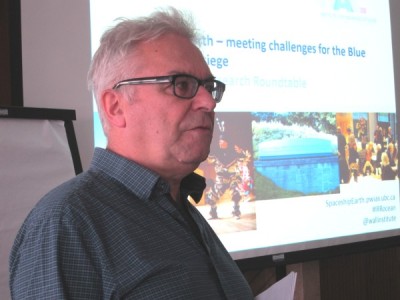 Derek Gregory, Distinguished Professor at Peter Wall Institute for Advanced Studies (PWIAS) extended a warm welcome to the participants on behalf of former Executive Director, Janis Sarra. He underscored the appreciation of the innovative and participatory approach chosen for this roundtable and expressed the expectation of PWIAS to garner interesting results.
Derek Gregory, Distinguished Professor at Peter Wall Institute for Advanced Studies (PWIAS) extended a warm welcome to the participants on behalf of former Executive Director, Janis Sarra. He underscored the appreciation of the innovative and participatory approach chosen for this roundtable and expressed the expectation of PWIAS to garner interesting results.
Beau Dick, Hereditary Chief of the Kwakwaka'wakw and wood carver, performed a ceremonial song to atune all participants to the unceded territories of the First Nations in British Columbia.
U. Rashid Sumaila, Cornelia E Nauen and Sarah K. Meltzoff as principal investigators of the roundtable joined Derek in welcoming participants and inviting them to address together the major challenges to our oceans and seek new ways to connect to the issues and to one another.
They were joined via skype by Vanessa Reid who, together with Maria Scordialos, had partnered in the preparations and specifically in the design, but could not be part of the hosting team in person.
Ngaio Hotte as coordinator and co-host added her voice to the welcome and looked forward to a productive week together.
Checking-in – who's in the room?
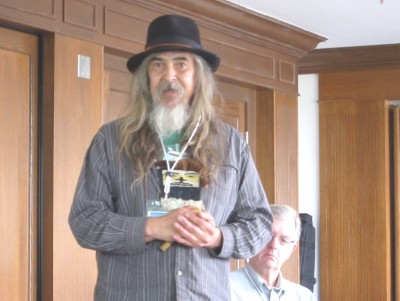 Ngaio then invited participants to present themselves guided by three questions:
Ngaio then invited participants to present themselves guided by three questions:
-
What draws you to this conversation?
-
What do you bring to the roundtable in terms of expertise, experience, inspiration?
-
Share the story about the object you brought that connects you to the ocean.
As one participant after another spoke, generously sharing their expertise and their very personal stories of how they were connected to the ocean, the amazing diversity in the room became evident.
Most participants were working in the Vancouver area, thus had initimate knowledge of the place.
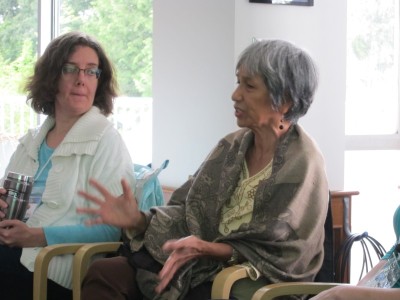 Their stories blended beautifully with those of the participants from more distant places, all drawn to the gathering by their concern for the oceans.
Their stories blended beautifully with those of the participants from more distant places, all drawn to the gathering by their concern for the oceans.
They always had an unexpected and often very personal angle to them, showing deep connections, passion and commitment, beyond the public personality.
There was Naomi Takagi, a confirmed organist, recalling how her family's trajectory had been bound up with fisheries and the ocean.
Francisco Alarcón, Lecturer at the Department of Spanish and Portuguese, University of California Davis, and a poet and writer of childrens' books gave samples of how the attention of young people could be drawn to the oceans and their amazing creatures.
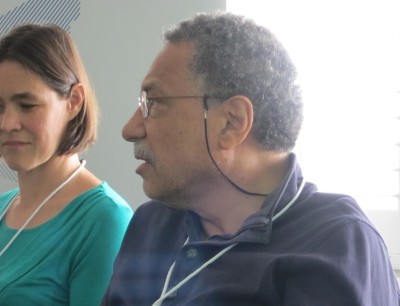 There was Jurgenne Primavera, scientist emerita, Southeast Asian Fisheries Development Center (SEAFDEC) in the Philippines, sharing her transformation from a well-established shrimp aquaculture researcher into the leading authority about mangrove protection in the region.
There was Jurgenne Primavera, scientist emerita, Southeast Asian Fisheries Development Center (SEAFDEC) in the Philippines, sharing her transformation from a well-established shrimp aquaculture researcher into the leading authority about mangrove protection in the region.
Some of the young scientists had already travelled different parts of the world in the pursuit of their questions about the oceans and how to protect them more effectively.
The story each participant shared in answering the introductory questions also had the effect of pulling the curtain apart to see the personal relationship with the ocean behind the budding or already confirmed and outstanding scientist, the up-and-coming artist or the practitioner.
Their connections to the sea were as diverse as can be, but they all had in common to be curious about meeting people with different backgrounds they would not often cross paths with in their ordinary professional lives. So the scene was set to enter into the programme of the week.
Appreciative Inquiry
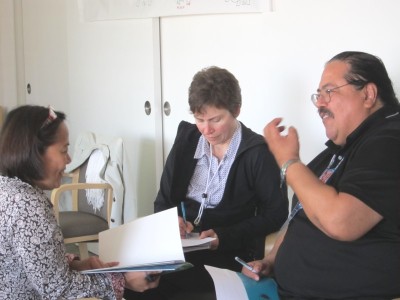 Cornelia introduced the method called Appreciative Inquiry (AI). Participants were invited to form groups of three on a voluntary basis to tell each other about a positive experience each one has had.
Cornelia introduced the method called Appreciative Inquiry (AI). Participants were invited to form groups of three on a voluntary basis to tell each other about a positive experience each one has had.
In three rounds of about 10 minutes respectively, each participant took on a different role:
- of the story teller,
- of the reporter taking notes and
- of an observer asking clarifying questions to ensure the key points came across and were recorded accurately.
Each reporter obtained a simple worksheet to record the name of the reporter, the owner and title of the story, why the story teller considered it a good experience and what made the experience into a “success story”.
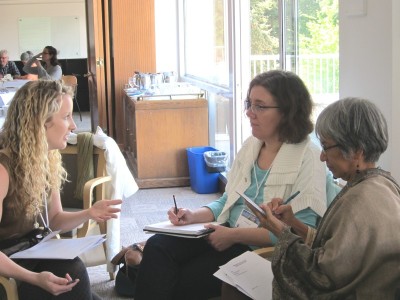 After a little more than half an hour, all participants gathered outside on the terrace with view on the sea and the mountains to harvest a sample of stories.
After a little more than half an hour, all participants gathered outside on the terrace with view on the sea and the mountains to harvest a sample of stories.
Several people volunteered their experiences. Among the reasons for good experiences, the participants noted:
- Overcoming obstacles through perseverance,
- Gaining or giving access to knowledge,
- Rediscovering self, one's cultural identity, reconnecting to ocean, family, dream in life ...
What were contributing factors?
- Teaming up with like-minded others,
- Pioneering an inclusive approach,
- Doing it rather than waiting for endorsementby “experts”, in particular “no data” is no excuse for no action,
- Listening, being respectful of others and their perspectives and learning.
Conversation with the ocean
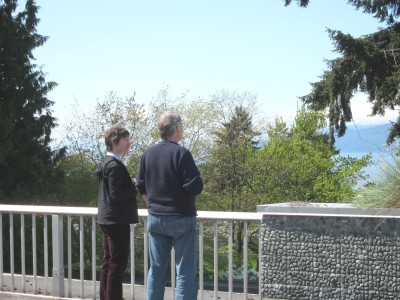 Ngaio asked participants to pair up with someone else and use approximately 45 minutes to connect to the ocean in whatever spot they felt allowed them to do that and listen to what the ocean tells us, what the issues are and how does it speak to us? What are the sensations, images, ideas, words and connections that it reveals?
Ngaio asked participants to pair up with someone else and use approximately 45 minutes to connect to the ocean in whatever spot they felt allowed them to do that and listen to what the ocean tells us, what the issues are and how does it speak to us? What are the sensations, images, ideas, words and connections that it reveals?
Upon return, in the checkout for the day, the participants expressed many different thoughts that had been evoked during the walk.
Check-out – What did the ocean tell us?
The AI compared somehow to the human experience with the ocean, yet can not model perceptual experience.
The metaphore of the sea as the inmeasurable and infinite – conveys a different sense of the quantifiable place, where we are.
The effects of climate change: sealevel rise, acidification, migration of marine species and humans are already being observed.
In conclusion of this first day spent together, key listeners Rashid, Cornelia and Sarah captured some of the impressions collected from the conversations. They expressed their gratitude for the openness of participants to engage with one another and with the central theme of the workshop sharing generously their professional and often very personal perspectives and experiences.
While using different means of inquiry in the sciences, in the arts and in action in the search for making sense of the world surrounding us, we had found ways of respectful communication that brought out some new insights and compatibility between the different findings, which are indicative of the robustness of our starting point.








